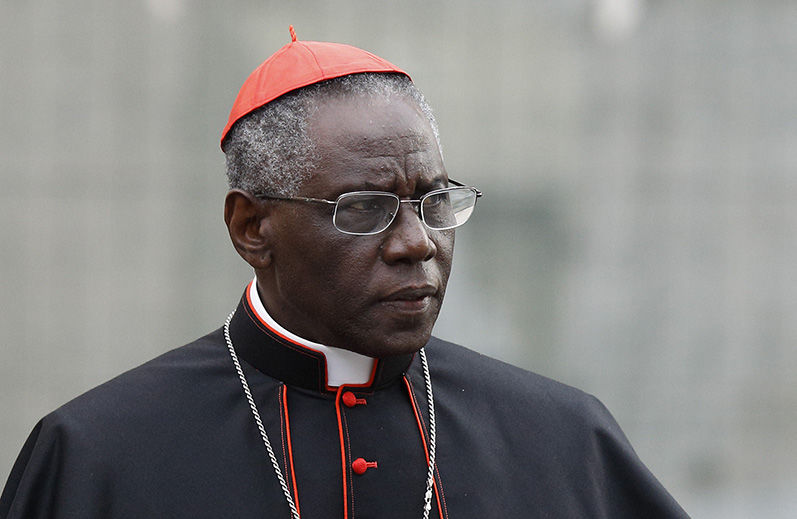The attention of the citizens of the United States is gripped, understandably, by the upcoming elections and all the implications of a Clinton or Trump presidency. Our religious freedom, economic prosperity and countless other considerations hang in the balance. But it’s not just Americans who are vitally interested in the outcome.
“What happens in America has repercussions all over the world.”
These were the words of Cardinal Robert Sarah at last summer’s National Catholic Prayer Breakfast. The slight, spare man who captivated the audience speaks soberly with the mellow accent of Guinea, Africa. A quick look at his biography explains why his smile is kind but fleeting.
He was appointed by St. John Paul II in 1979 as Archbishop of Conakry at the tender age of 35, because the prior archbishop was being held and tortured in prison by the communist dictator Sekou Toure. The priest willingly became the shepherd of the small Catholic minority and a prime target in the sights of a regime that reportedly killed at least 50,000 Guineans in concentration camps such as the notorious Camp Boiro. He was elevated to cardinal in 2010, and has held prestigious positions under the last three popes.
This son of the suffering, war-torn developing world had a very specific message for his audience. He reminded us that the influence of the United States in the affairs of weaker nations is tremendous. Pope Francis has called this outsized impact ideological colonization. This is when, by design or thoughtless practice, our values and outlooks are carried to the developing world. Too often, changes in traditional practices and social mores that support marriage and family are insisted upon in exchange for aid. This can inflict tremendous damage on cultures that are already under great stress from hunger, war and disease.
Cardinal Sarah explained that rapid social and economic development in the West has not been accompanied by equal spiritual progress. Relying on technical and scientific solutions — not God — modern Westerners believe we are entirely self-sufficient. This results in radical individualism, loneliness, the closing of our hearts and the discarding of the elderly and unborn. If God is a dead concept, then moral truths are eclipsed and moral relativism triumphs. Love becomes not self-sacrifice but simply the satisfaction of sexual instincts, and any immorality is permitted in the name of utility and progress.
The West’s “modern” views result in self-inflicted wounds, like divorce, cohabitation, same-sex marriage and gender ideology. These close the heart and lead to cynicism and despair, damaging children by “inflicting upon them a deep existential doubt about love.” As though the poor of the world were not already suffering enough, these damaging ways are imposed on them in exchange for economic aid.
That they should face the disintegration of their families, as we have faced ours, is a terrible exchange for material assistance. Social and moral damage is more painful than poverty. The hunger for love is much more difficult to relieve than the hunger for bread.
Of course, to fight against moral relativism, the disintegration of the family and the “throw-away culture” at home or abroad, our religious institutions must be alive and strong. Cardinal Sarah told his audience to use the freedom given by our Founding Fathers lest we lose it.
A million people, he said, have been martyred in this young century because they believed in Jesus. And beautifully: “Violence against Christians is not just physical, it is also political, ideological and cultural. This form of religious persecution is equally damaging, yet more hidden. It does not destroy physically but spiritually; it demolishes the teaching of Jesus and his Church and, hence, the foundations of faith by leading souls astray. By this violence, political leaders, lobby groups and mass media seek to neutralize and depersonalize the conscience of Christians so as to dissolve them in a fluid society without religion and without God. This is the will of the evil one: to close heaven out of envy.”
These are important words to reflect on as the election approaches. The preservation of religious liberty in the United States is crucial. First of all for the believer who should have the joy to live out his convictions freely. Second, for our society, which must be reinfused by Christian values with rich ideas about the dignity of man, the beauty of the family and the sacrificial nature of true love. And last, but certainly not least, for the people of poorer, weaker countries, who too often have our culture, good or bad, foisted upon them.

